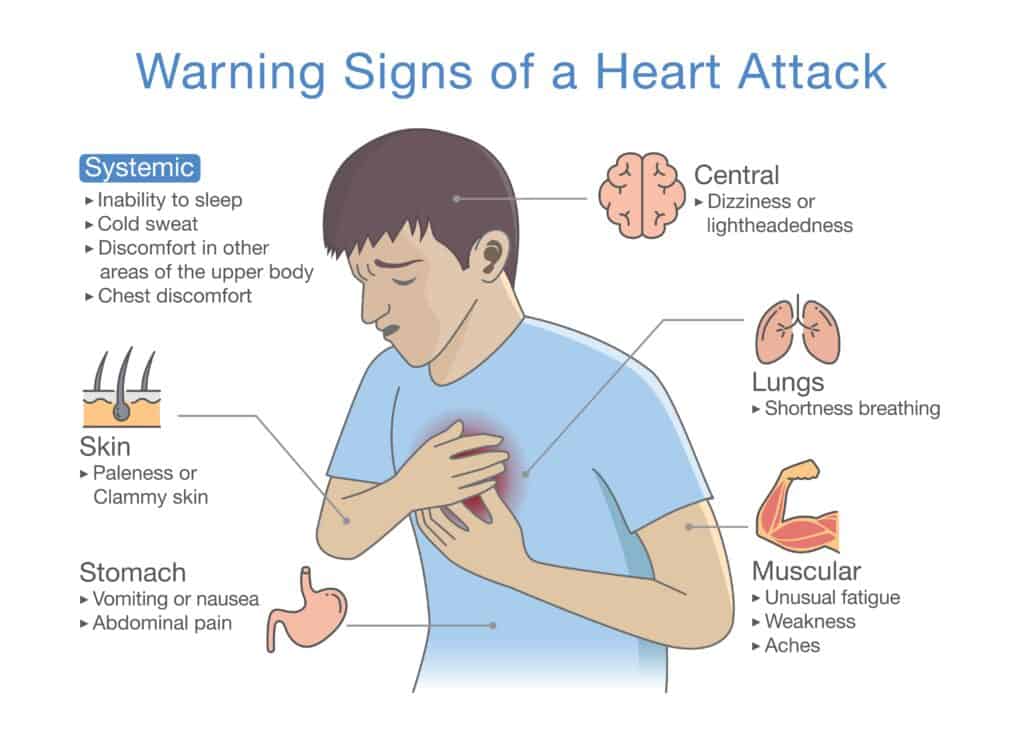
The first thing you will assume when you get a chest pain is that you’re about to get a heart attack. But is it? Well, chest pain isn’t something you should ignore, but it always does not mean a heart attack. There are several reasons why you may be suffering from chest pain; some may be mild, while some may be dangerous. As a result, you must consider it all.[1]
One of the most interesting facts about chest pain is that not all chest pain is related to your heart. A lot of people experience chest pain due to muscles, ribs, nerves, lungs, and esophageal problems.[2] Most of the time, these conditions can turn out to be life-threatening.
Reach out to a doctor should you have any chest pain, which may range from your neck to the abdomen. The severity of the chest pain varies depending on the cause. However, some of the prominent signs of chest pain include the following.[3]
- Dull
- Burning
- Sharp
- Aching
- Stabbing
- Squeezing sensation
Is chest pain only related to the heart?
As stated, chest pain is not only related to heart but other organs as well and can prove to be fatal too. Although it may be a sign of a heart attack, you need to check for other potential symptoms too.[4] Chest pain can also be a symptom of other problems such as
- Respiration
- Digestion
- Physical and mental health
- Bones and muscles
Even if you notice mild chest pain, it is necessary to take it seriously and reach out to the doctor. Chest pain can become life-threatening if it isn’t taken into consideration from the beginning.
It is essential to determine how your chest pain can be a medical emergency. Scheduling regular appointments with your doctor can help you avoid the risk of medical complications.
Signs of a medical emergency
If the chest pain is serious, you will eventually know it because the signs will become prominent. Heart attack won’t always show signs of chest pain.[5] You will be prone to having a heart attack only if the following symptoms accompany your chest pain
- Shortness of breath
- Nausea
- Fainting feeling
- Cold sweat
If the symptoms last for more than 5 minutes, you need to reach out to an emergency service soon. Sometimes a heart attack is also accompanied by pain around the jaw, neck, arms, and back. Thus, it is essential to keep a check on these signs.[6]
Chest Pain and Heart diseases
Some of the common cardiovascular diseases in which you will be prone to chest pain include
- Coronary artery disease or CAD
This leads to blockage in one of the heart blood vessels, thereby reducing blood flow. It leads to pain referred to as angina. This is one of the leading signs that you may be prone to a heart attack in the future. It will also be accompanied by pain around the jaw, shoulder, and arm. Sometimes, angina can also occur due to excessive rigorous training, emotional stress, and excitement.
- Myocarditis
This disease may lead to heart inflammation, which may further cause problems such as fever, fatigue, fast heartbeat, and more. Several patients also suffer from shortness of breath, which is why it is essential to keep a check on it.[7] Although there is no blockage, sometimes myocarditis may feel like a heart attack because the symptoms are the same.
- Hypertrophic cardiomyopathy
This is a genetic disease due to which the heart muscles become too thick. This further causes interruptions in the blood flow. Apart from chest pain, the patient may also suffer from shortness of breath. Heart failure is also very much probable since it is tough for the heart to pump blood. The patients also experience signs of fainting, dizziness, and lightheadedness.[8]
Apart from this, the patients also suffer chest pain in other cardiovascular conditions such as coronary artery dissection, myocardial infarction (heart attack), and pericarditis.

Chest Pain and Lungs Problem
The severity of the chest pain may vary depending on the lung’s problem.
- Pleuritis
This is one of the prevailing conditions in which the lungs inflammation starts. Patients have a tough time coughing, sneezing, or breathing because they experience a sharp pain around their chest in such conditions. Some of the joint pleuritic chest pain include viral infections, pneumothorax, and pulmonary embolism.[9]
- Pneumothorax
This is an injury to the chest that occurs mostly when the lungs collapse. There’s a cavity around the chest that can lead to the pain becoming worse. The patients eventually have a tough time breathing since they experience several other symptoms, such as low blood pressure.
- Asthma
Asthma patients mostly suffer from shortness of breath, coughing, and wheezing. This is also one of the most prominent inflammatory disorders that can prove to be extremely harmful to overall health.
Chest Pain and Gastrointestinal Problem
People also experience chest pain due to gastrointestinal problems. Some of the most common ones include the following.[10]
- Esophageal rupture or perforation
This is sudden pain in the chest that develops mostly due to excessive vomiting. The rupture of the esophagus further worsens the symptoms.
- Esophageal contraction disorder
Uncoordinated muscle contraction and high-pressure contraction is extremely harmful to the lungs. These eventually arise in the chest, causing a number of problems that make your body prone to different diseases.
- Gastrointestinal reflux disease
Popularly known as GERD, this is one of the most common gastrointestinal problems where the stomach contents move up to the throat. This eventually leads to a sour taste in the mouth. Most people also experience heartburn (burning sensation in their hearts).[11] Often heart pain is confused with that of heartburn, which is why it is essential to keep a check with it. Also, since the heart and esophagus are located very close to each other, heart pain is confused with heartburn.
Most people also suffer from chest pain due to panic attacks and anxiety. Shortness of breath and dizziness is the common scenario in both cases. Therefore, people prone to frequent heartburns and chest pains must schedule regular visits with a doctor.
[1] https://www.ncbi.nlm.nih.gov/books/NBK470557/
[2] Jänig W. [Neurobiology of visceral pain]. Schmerz. 2014 Jun;28(3):233-51. [PubMed]
[3] https://www.ncbi.nlm.nih.gov/books/NBK416/
[4] DeSanctis RW, Doroghazi RM, Austen WG. et al. Aortic dissection. N Engl J Med. 1987;317:1060–67. [PubMed]
[5] https://www.ncbi.nlm.nih.gov/pmc/articles/PMC4721048/
[6] Richter JE, Castell DO. Esophageal disease as a cause of noncardiac chest pain. Adv Intern Med. 1988;33:311–36. [PubMed]
[7] Lee TH, Goldman L. Evaluation of the patient with acute chest pain. N Engl J Med. 2000;342:1187–1195. doi: 10.1056/NEJM200004203421607. [PubMed] [CrossRef] [Google Scholar]
[8] Borjesson M, Dellborg M. Before intervention – is the pain really cardiac? Scand Cardiovasc J. 2003;124–127. [PubMed]
[9] Ebell MH. Evaluation of chest pain in primary care patients. Am Fam Physician 2011;83:603–5. [PubMed] [Google Scholar]

